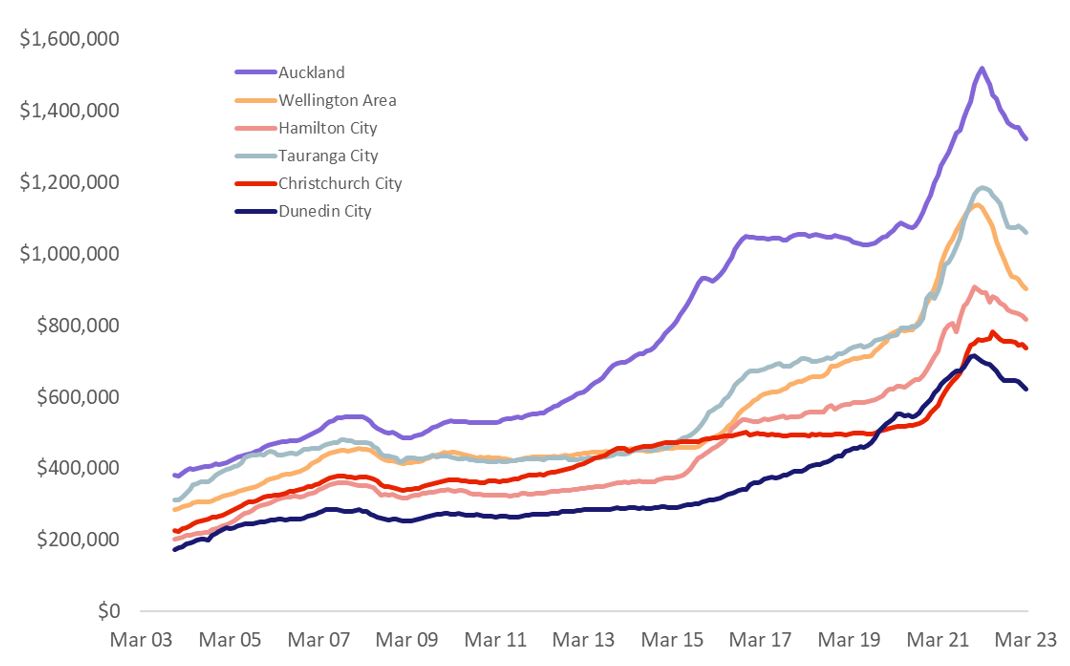The downturn in New Zealand’s property market continued in March, with average values down another 1.1%, according to the CoreLogic House Price Index.
After a couple of ‘flatter’ months in December and January, average values have dropped at least 1% for each of the past two months. CoreLogic’s House Price index is now down 10.5% or an equivalent $109,491 over the past year.
CoreLogic NZ Chief Property Economist, Kelvin Davidson said it was important to keep the falls in context of the 43% surge between March 2020 and March 2022, with prices currently still around 30% higher than pre-COVID levels.
He said the latest falls in February and March were part of the market cycle’s more recent trend and consistent with the underlying drivers.
“Almost regardless of what the Reserve Bank (RBNZ) decides to do with the official cash rate (OCR) later today, there are now signs of a peak for mortgage rates, while employment also remains healthy. But interest rates for both new borrowers and existing borrowers who are repricing remain elevated, and this is requiring some careful budgeting,” he said.
“Mortgage availability also remains restricted and neither buyers nor sellers are in much rush, meaning market activity is low. These factors make it easy to see why property values are continuing to drop.”
Mr Davidson said the market’s expectation is for the RBNZ to announce an increase in the OCR of at least 0.25%, possibly even 0.5%, at 2pm today.
However, he said this month’s hike could also be the last of the cycle, especially if the Q1 2023 inflation data shows a clear slowdown when released on 20 April.
“With inflation still an issue, it’s not out of the question that the cash rate will increase by 0.5%. However, there are fairly clear signs that the economy is faltering and the recent global banking sector problems point to a more cautious approach from the RBNZ,” Mr Davidson said.
“At the same time, the RBNZ won’t want to run the risk that financial markets start to ‘price in’ OCR cuts in the near term, which would undermine their inflation fight to date. The language in today’s statement will still be tough-talking. For borrowers, even if the current 6.5% or so is the ‘worst case’ for mortgage rates, don’t necessarily expect them to fall sharply anytime soon either.”
Among the main centres, there was a tight bunching of falls in March, with Auckland, Tauranga, Wellington, Hamilton, and Christchurch all 1-1.5% down. Dunedin was the weakest, with a decline of 2% in March.
CoreLogic House Price Index – Main Centre Average Value
The key differences start to emerge between the year-on-year comparisons. Christchurch has recorded only a small decline in average values since March last year (-2.9%), which reflects its relatively favourable starting point for housing affordability.
By contrast, Wellington stands out for the most weakness over the past year or so, reflecting its previous long boom and the stretched position for housing affordability as we entered this downturn.
Upper Hutt, Lower Hutt, Porirua, and Wellington City have all seen falls of around 20-21% over the past 12 months, with Kapiti Coast down by a lesser but still significant 15% or so.
Auckland’s property market generally continued to drop in March, albeit the Auckland City sub-market only declined by 0.2%, while Franklin actually recorded an increase of 1.7%. However, Franklin’s average values are still down by 2.6% over the past three months and by 11.1% since March last year. Across the various Auckland sub-markets, the annual declines have been in the range of 10-15%.
Regional House Price Index results
Outside the main centres, there are still some quite divergent trends in property values.
In March, values dropped in a number of markets by 2-3%, but Whanganui and Palmerston North avoided falls, while Queenstown actually increased by 1.8%. Areas such as Nelson and Palmerston North have also been flatter over the past three months as a whole, while again Queenstown has risen.
“Regional variability doesn’t come as any major surprise, given the different local factors that apply at any point in the cycle,” Mr Davidson said.
“But it’s still quite striking to see Queenstown’s values holding up well, yet other ‘provincial’ markets declining at double-digit annual rates. In an environment where credit conditions are generally restraining activity and prices, this illustrates the power of cash/wealth in a market such as Queenstown.”
Near-term challenges, but light at the end of the tunnel?
Looking ahead, Mr Davidson said the property market still has significant near-term challenges, including a possible recession and the wave of mortgage repricing that still has to be worked through by borrowers and the banks.
“The housing market ‘mood’ is pretty subdued at present, with both buyers and sellers having become accepting of tough fundamentals and lower prices. However, the first marker for this downturn coming towards its conclusion – a mortgage rates peak – now seems to have been reached,” he said.
“When you add relative resilience for employment, rising net migration, and perhaps some scope for investors to sneak back into the market towards election time – if they deemed a National victory and the reinstatement of interest deductibility relatively likely – there’s a case building for property sales activity to creep higher later in 2023 and for prices to stop falling.
“It’s a bit chicken-and-egg, but the current negative mindset could also shift quickly alongside those other key drivers, adding to the light at the end of the tunnel for late 2023.”
Download the latest House Price Index

